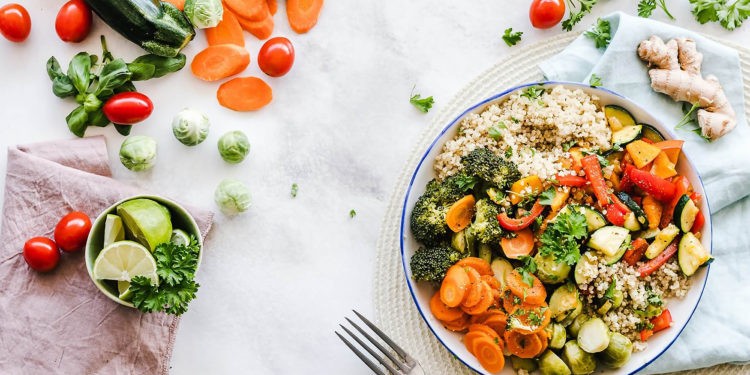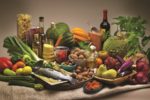Sustainable Eating Habits

Sustainable eating is not about eating less; it is about eating right for your health and the environment.
Sustainable eating. That’s a phrase you have probably heard a few times in your life by now. What does it mean, however? It sounds as if it could be complicated, but in reality, it truly is not. Sustainable food is simply food that is healthy and safe to eat. It is made without the use of hazardous pesticides, chemicals, unnecessary antibiotics and/or growth promotion supplements. Sustainable food uses production techniques designed to protect the environment, public health, communities and even animal welfare.
This is the time of year when we typically begin to think about all the food we are putting into our bodies. With the holidays in clear view, we may stress and fret about what to eat and what not to eat, finding ways to indulge and enjoy without necessarily expanding our waistlines or robbing ourselves of the nutritious foods we need. That being said, is it possible to adopt or stick to a sustainable eating lifestyle during the holidays? Well, first, let’s take a quick peek into what a sustainable plan can entail.
What can you do to begin adopting a sustainable diet/lifestyle?
The first step towards embracing a sustainable eating lifestyle is to make more food at home. Packaged foods create excessive waste and end up going to a landfill. Granted, life can get incredibly busy, but by simply sparing a bit of time to do this, you can have a huge impact on the environment in the long run.
Purchase organic foods whenever possible. While these can be a bit more expensive than non-organic foods, this option is not only better for the planet but also better for you because they are not produced with synthetic pesticides. When you purchase organic food products, buy locally. It takes resources to package and transport food to you from other places. Be aware of where your food comes from.
Consume more plant-based foods and less animal products. Whatever we eat takes resources to produce. Studies have shown animal agriculture creates 40% of greenhouse gas emissions emitted on earth. By aiming for a plant-based diet three to four times a week, you can make a huge impact on the environment.
Get in the habit of composting any food scraps you will not use. This can later be used as fertilizer for plants you might already have or you can give it to farms. Food waste is biodegradable, but when left just sitting in a landfill, it can become toxic and harmful to the environment.
Go grocery shopping fully prepared. Opt for bulk foods, minimally-processed foods and more plant-based meals. This results in less packaging and waste, as well as less energy and water used to produce certain foods.
Consider growing your own food, such as herbs in a pot, tomatoes on your patio or creating a small garden spot in your yard. When you grow your own food, you develop a sense of understanding as to what is involved in making plants thrive, what makes them grow and how certain factors can be harmful to them. With these insights you are more likely to be influenced in terms of what you purchase, use and dispose.
As the holidays begin to tempt you, a sustainable eating plan will keep you on track.
As you shop for your holiday gatherings, shop for more plant-based foods, such as beans, peas, lentils and peanuts, as well as whole grains, vegetables, fruits and nuts. Avoid red meat and processed meat. Limit refined grains and added sugars.
While certainly the holidays invites an attitude of overconsumption and the acceptance of it being okay to eat more than normal, it is still important to think in terms of sustainably during the festive season. If you absolutely have to indulge in some meat products, focus on those as a treat, but keep the plant-based foods as a priority. Excessive consumption of meat has been liked to illness such as heart disease, certain cancers and Type-2 diabetes.
Purchase food made locally. With food being transported the world over, the carbon footprint left behind is huge. Visit your local farmers’ markets that stock what is grown in your state. Appreciate the seasons and what they have to offer, from tomatoes to berries and more.
Even though the holidays tend to have a dramatic focus on food, slow down and enjoy what is really important: the people with whom you are celebrating. While eating sustainably means developing a healthy relationship with food, this is the time of year to take the time to share memories around the table with loved ones.
When it comes to leftovers, the goal is to reduce food waste. Get creative with your leftovers. No one wants turkey sandwiches every day for a week, do they? Instead, turn those leftovers into something unique, such as creating a salad out of leftover veggies and the meat or cook it up with some grains and some couscous. Provide your guests with doggy bags full of goodies to share all of the wonderful food.
Bottom line: what we put on our plates matters. The choices we make every day may seem small to us, but over time, they will impart a huge and positively significant impact on our health and on the world around us. You don’t have to make major changes in your lifestyle. Just focus on reducing your animal intake and expand your palate to eating more locally and seasonally, making more homecooked meals.
Sources: eatright.org, globalcitizen.org, sustainability.ncsu.edu






